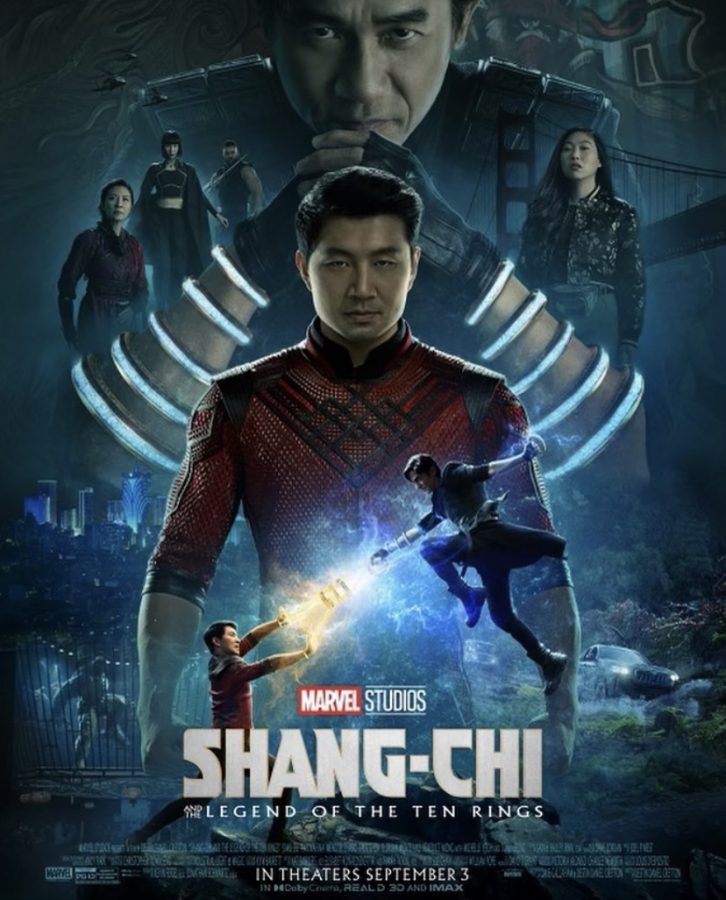Marvel Studios’ “Shang-Chi and the Legend of the Ten Rings” sets a new precedent, yet seemingly takes a step back. It is the first Marvel movie to feature an Asian hero who dazzles audiences with spectacular fight scenes and humor while simultaneously watering down the story of Chinese Americans.
Our star is Shawn (Simu Liu), the average 20-something in San Francisco: living in a small studio apartment, working a minimum wage valet job and slightly irresponsible. He spends his days working and partying with his equally irresponsible best friend, Katy (Awkwafina).
But, Shawn is hiding his true story from her. Shawn’s true name is Shang-Chi. His mother (Fala Chen), who died when he was a child, was a martial artist from another dimension whose powers rivaled his father’s (Tony Chiu-Wai Leung). Shang-Chi’s father is a millennia old warrior, with the power of the 10 rings bound to his arms. After his wife dies, he becomes hell bent on avenging her and making Shang-Chi a powerful fighter.
That’s still not the whole family. Shang-Chi has a little sister, Xialing (Meng’er Zhang), who defected from the family to create her own fighting ring empire. When Shang-Chi is sent a cryptic postcard, he is recalled to his family to finally put their issues to rest.
For the most part, the story is well paced and intriguing. But because the story does not start at Shang-Chi’s true beginning, the story’s pace came to a halt with inserts of Shang-Chi’s backstory.
Shang-Chi needs to be carried by the characters around him before he can truly shine at the end of his story. This is slightly compensated by the fact that the supporting cast can stand on their own and keep the audience engaged.
Xialing, for example, is an incredible fighter who runs her own dark web fight ring. Katy, who serves as viewers’ comic relief, really shines simply by being played by Awkwafina. It’s a shame her and Simu Liu don’t have the chemistry or script to create some amazing humor.
One of the main themes of this movie is the culture of Chinese Americans. For the first few acts of the movie, Chinese American culture is wonderfully represented and respected. Katy lives in a multi-generational household with her traditional grandmother and mother who pester her about finding a better job and getting married.
The music in the movie also reflects Asian Americans as a whole with songs by BIBI, NIKI, keshi and more Asian artists.
Yet, this appreciation of Asian and Chinese Americans becomes lukewarm in the final acts of the movie. Most of the final act involves superficial marks of Chinese culture. While the fight choreography is visually interesting, the shallow understanding of Chinese culture leads to a goofy end fight scene.
With respect to those who have not seen the movie: spoilers in the next paragraph.
The last act feels uncreative. There was almost no Marvel flair besides Shang-Chi’s magic bangles. During the final battle, Shang-Chi learns he has the power to summon a dragon, known as “The Great Protector,” from a mystical pond. He flies on this dragon with his sister to defeat his father while the army of warriors from another dimension do magic martial arts below them.
The movie sticks to the stereotypes of American-made Chinese movies or popular Chinese films. Think of “Kung Fu Panda” with some inspiration from “Crouching Tiger, Hidden Dragon.” While there is nothing inherently wrong with these movies, it waters down Chinese people and Chinese Americans to be Kung Fu masters with the power of the dragon.
That’s not to say these tropes were done poorly or with malice. However, the filmmakers simply could have done away with them or written them in a fresh way. “Crazy Rich Asians” is a perfect example of proper Asian representation without feeling cheesy or shallow.
These factors alongside a lack of advertising for this movie have caused audiences to question if Marvel was truly interested in having an Asian Avenger or if they felt it was just a cross off of a list of races needed in order to have a diverse cast.
Hopefully, Marvel hears these concerns and make the changes necessary to create a better film for Shang-Chi’s sequel. This Avenger truly has the potential to create a powerhouse series for Marvel; they only have to give Shang-Chi and the audience the respect they deserve.










